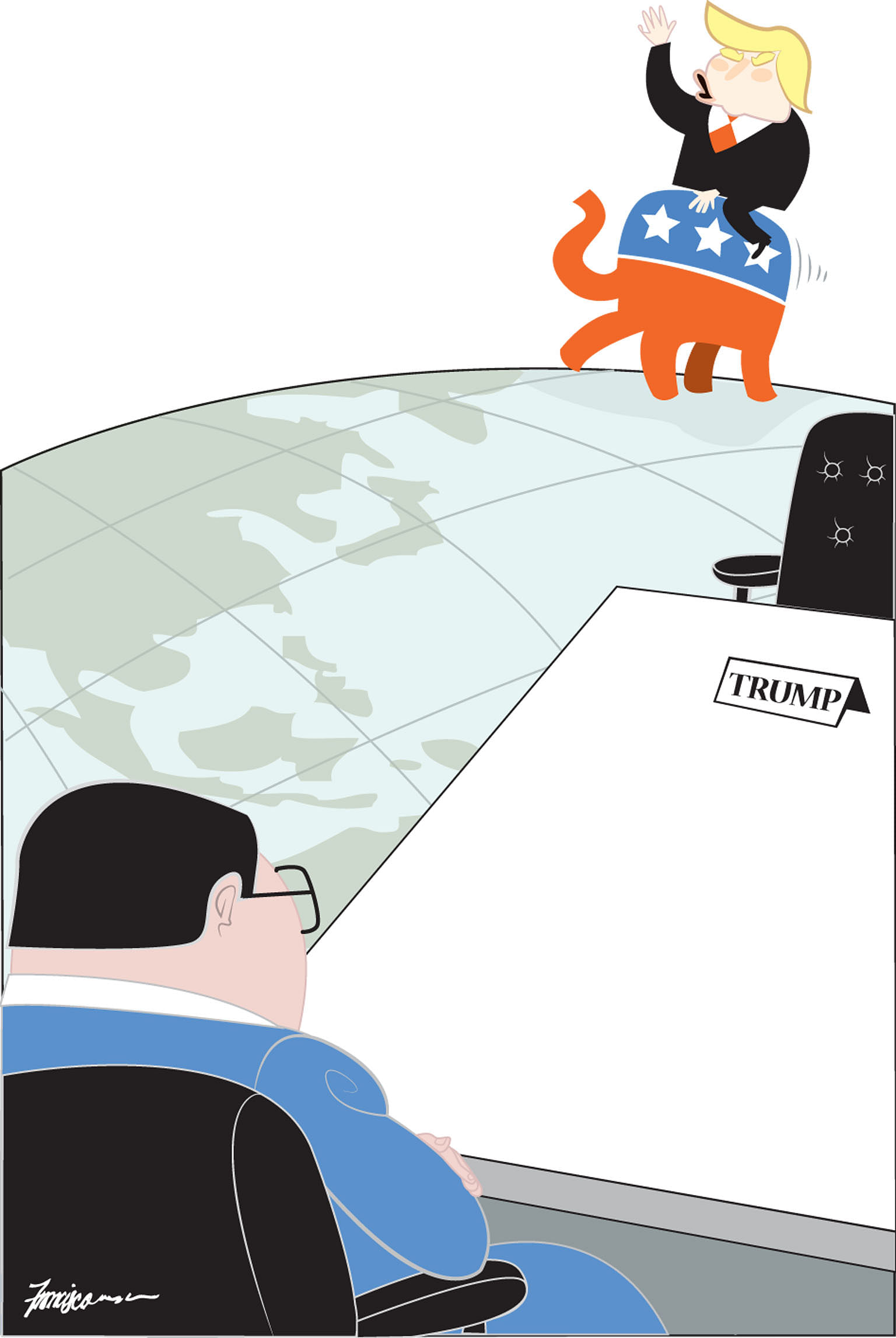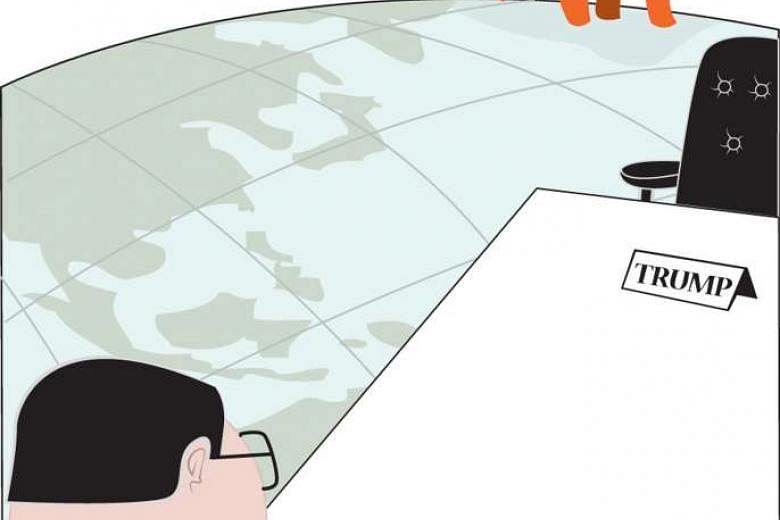A year ago, the question uppermost on the minds of strategic thinkers as they mapped the evolving Asian security scenario in the Asia Pacific was how enduring would be the coalescing power formation that would effectively bookend Asia with the US as its lynchpin.
Would Japanese Prime Minister Shinzo Abe's enthusiasm to give Japan a "normal" military that could also export arms and come to the aid of key allies outlast his tenure? Would India's strategic embrace of the US and Japan persist beyond Prime Minister Narendra Modi, given the nation's innate instincts are towards non-alignment? Would Australia, under Prime Minister Malcolm Turnbull, have a more nuanced policy than the enthusiastically pro-Western Tony Abbott? The US anchor around which much of this was built was the least of the worries.
Today, America - and the prospect of an untested and isolationist Donald Trump being in charge for the next four years - itself has become the subject of much hand-wringing. Interestingly, there is less concern about the durability of its Asian partners. Thanks to recent rule changes in his party, Mr Abe looks set to be around until 2021 and Mr Modi at least until 2019, possibly longer. Mr Turnbull, for his part, scraped through in the recent elections.
Perhaps we should hold off on the panic for a bit. Mr Trump has just got used to the idea of being the President-elect of the world's only superpower and it appears he hasn't even got a grip on his own camp yet, seeing the squabbling and power struggles that have erupted within as the transition proceeds. What are the chances that he has had time to give serious thought to Asia? Not a lot.
Yet, there are some straws in the wind. Of the eight world leaders Mr Trump spoke with in the first 24 hours after his victory, four were from the broad Asian region - South Korea, India, Japan and Australia. He has already started walking back some of his most sharp-edged comments and commitments during the campaign, including a vow to scrap the nuclear deal with Iran. On affordable healthcare, it now seems there will be no complete reversal but tweaks to the plan introduced by President Barack Obama. These developments promise a certain flexibility.

Sure, he has a more visceral attitude towards trade deals and because of this, the Trans-Pacific Partnership (TPP), the signature tune for the economic part of the so-called Obama rebalance to Asia, seems headed for the freezer. Yet it may be premature to write its obituary.
Mr Trump cannot miss the fact that both Japan and New Zealand ratified the deal after the US election - a pointed message to America. His conversation yesterday with Mr Abe, the first of the world leaders to get to meet Mr Trump since the election, would have given him a clearer picture of what's at stake. And Vietnam's decision to shelve its ratification and stick to its long-standing "independent foreign policy" is one more signal how Asian nations are swiftly preparing for a time when the US writ does not run in Asia.
Mr Abe has a way of bonding with strong personalities like Russian President Vladimir Putin and Mr Modi. That should help him with Mr Trump. The last time a US president and a Japanese premier enjoyed warm personal ties was when Mr George W. Bush was in the White House and Mr Junichiro Koizumi was in charge of Japan.
Getting Mr Trump to soften up on TPP may depend to a large extent on Mr Abe. On the stump, Mr Trump has spoken about getting Japan and South Korea to pay the full costs of the US security umbrella. Tokyo currently pays about three-quarters of it, or 377 billion yen (S$4.9 billion), a figure Mr Abe has called "adequate". By yielding, even a bit, Mr Abe may be in a position to give Mr Trump an early diplomatic victory that could potentially help him dilute his opposition to TPP.
Mr Trump cannot be unaware of TPP's significance. Besides, that's not the only pressure point on him. The first newspaper to land an interview with Mr Trump after the election was the Wall Street Journal, a sign of his evident respect for that mast. The Journal has consistently and clearly called for the US to stay committed to Asia and TPP.
The big question, of course, is how he will approach China. In the run-up to the poll, the Chinese seemed to have preferred a Trump win over a victory for Mrs Hillary Clinton, who initiated the Obama pivot to Asia. Now, people described as his close foreign policy advisers suggest that Mr Trump will have a more muscular policy towards Beijing, and that he will brook no challenges to American dominance.
In their view, Mr Obama's Asia pivot was a failure because it was essentially hollow, not backed by strong will. They blame Philippine President Rodrigo Duterte's turn to China as borne by suspicion that the US, despite its treaty relationship with his country, will ultimately do little if Beijing pushed hard enough.
Mr Trump himself said in September that "history shows us that when America is not prepared is when the danger is greatest. We want to deter, avoid and prevent conflict through our unquestioned military strength". Hence, his stated desire to see the US Navy expand from 280 ships currently to 350 in a few years' time. If he does follow through on that, those ships he plans to build cannot all be parked in San Diego. Willy nilly, some are destined to show up in Asian waters.
Mr Trump clearly will be a different leader than Mr Obama, who laid red lines that Syria's President Bashar al-Assad must not cross, then looked the other way when he did. To many in Asia, it signalled Mr Obama's lack of resolve. It did not help, too, that the US also tried to pass off some of its innocent passages around islands claimed by China as freedom of navigations operations. Many believe all this contributed to emboldening China.
But a Trump administration could be an entirely different kettle of fish. A better assessment will be possible when Mr Trump announces his secretaries for state and defence. The current front runners for state are Mr Rudy Giuliani and Mr John Bolton, and neither are soft men. Another name that's recently surfaced is Mr Richard Armitage, who, in an earlier era, threatened then-president Pervez Musharraf of Pakistan that if Islamabad didn't reverse course to support the war on terror, the US would "bomb you into the Stone Age".
There is also talk that he may appoint South Carolina Governor Nikki Haley to the job, although they've clashed in the past over his foreign policy. Ms Haley may be useful to Mr Trump as an olive branch to the Muslim world, given her past opposition to his campaign talk of imposing a temporary ban on Muslims entering the US. Who knows? Instead of being isolationist, a more active American foreign policy could well be in store.
Still, unless the Chinese make surprise new moves to escalate the maritime situation, or the North Koreans rush a series of atomic tests and delivery systems - events that may concentrate the mind in Washington - Asia, particularly its less significant powers, must stand ready for a period of benign neglect by Mr Trump. It is no surprise that no South-east Asian leader figured in the list of 29 congratulatory callers who got through either to Mr Trump, or his Vice-President- elect, Mr Mike Pence, over the past week.
Meanwhile, Mr Obama's impending departure offers some Asean nations opportunities to repair their fractured relationships with Washington. The Philippines which, under Mr Duterte, has had a rotten relationship with Mr Obama, has started the process by saying it will continue to pursue a deal to buy thousands of rifles from the US after a miffed Mr Duterte threatened to go elsewhere for the weapons. Thailand, with Mr Obama out of the way, has a window to try a similar tack. An unsympathetic American ambassador's dim view of the Thai military taking power in that country contributed to the current chill in ties.
The bigger worry for Asia then may not be so much on the military front as economic. TPP apart, Mr Trump could take a more hardnosed view of not just trade but investments, especially if they involve employment. He also could be more sensitive to American assets being acquired by foreigners. Already, bankers and lawyers advising on mergers and acquisitions are telling their Chinese clients to take a pause on their attempts to buy US companies, not knowing which way Mr Trump will go, particularly in key sectors such as high technology. This year alone, Chinese firms have spent some US$225 billion (S$318 billion) on overseas acquisitions as capital seeks better returns, and the US has been the top destination.
Moody's, in a note to clients, warned yesterday that if US demand were to slow markedly because of a shift in policies - a probability which it regarded as "very low" - it could dampen trade and investment, and weaken growth in Asia. "The most open economies would be particularly vulnerable," Moody's said. "Asia Pacific tends to be more exposed to a global slowdown in trade than the Americas. In particular, Cambodia, Hong Kong, Malaysia, Singapore, Taiwan, Thailand and Vietnam, where global exports account for 50 per cent to 150 per cent of GDP, would be most vulnerable."
In hindsight, TPP was one of the most poorly sold policies of the Obama administration. It got too mixed up with the idea of containing China, even as it was not clear to most people how it would do so. Had the Obama crowd argued differently - that salaries in America's export-oriented industries tend to be 18 per cent higher than in domestic-focused ones - the logic of TPP and opening markets would have been stronger. What a fumble and what a shame!

